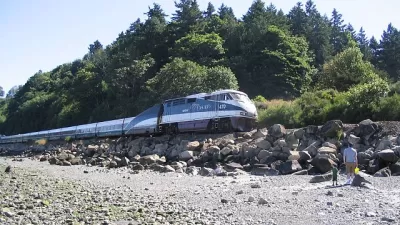A fractured rail is suspected as the cause of the worst train crash in India since 2010. The Indore-Patna Express train derailed near Kanpur in northern India. At least 200 are injured.
"At least 120 people are said to have have been killed and at least 200 more injured after a train derailed near the city of Kanpur in northern India in the country’s worst train crash since 2010," reports Vidhi Doshi in Mumbai for The Guardian.
Hundreds of people were trapped after 14 carriages of the express train, travelling from Indore to Patna [operated by the government-owned Indian Railways], crumpled into one another as they came off the tracks on Sunday.
Every day, more than 20 million Indians use the country’s heaving, out of date and poorly maintained railway system, the fourth largest in the world. Accidents on Indian trains are common and claim more than 25,000 lives a year, according to the National Crime Records Bureau [PDF].
[Correspondent's note: In "passengers carried in rail transport per year", it is ranked third, behind China and Japan, per Wikipedia.]
A document sent to the Guardian by Anil Saxena, a railways spokesman, said derailments were often caused by “poor maintenance of infrastructure especially at stations and failure to take appropriate precautionary measures against flash floods, landslides, boulder[s] falling, etc."
The Commission of Railway Safety "will look into the possibility of a fracture in the tracks as a possible cause of the accident, which led to the coaches to not only go off the rails but pile up, leading to high casualties," report Ramendra Singh and Avishek G Dastidar for The Indian EXPRESS. "Derailment is the cause of 50 per cent of all accidents in the Indian Railways."
Dastidar also reports in a subsequent article in The Indian EXPRESS that 695 passengers were on the train. The article focuses on travel insurance, indicating that the derailment "will be the first real test of the recently-launched optional travel insurance scheme for train passengers."
In a third article on the derailment, he reports that outdated coaches used on the Indore-Patna Express contributed to the high casualties on the train.
Hat tip to Emma Bowman of NPR.
FULL STORY: Desperate search for survivors after India train crash kills 120

Maui's Vacation Rental Debate Turns Ugly
Verbal attacks, misinformation campaigns and fistfights plague a high-stakes debate to convert thousands of vacation rentals into long-term housing.

Planetizen Federal Action Tracker
A weekly monitor of how Trump’s orders and actions are impacting planners and planning in America.

Chicago’s Ghost Rails
Just beneath the surface of the modern city lie the remnants of its expansive early 20th-century streetcar system.

Bend, Oregon Zoning Reforms Prioritize Small-Scale Housing
The city altered its zoning code to allow multi-family housing and eliminated parking mandates citywide.

Amtrak Cutting Jobs, Funding to High-Speed Rail
The agency plans to cut 10 percent of its workforce and has confirmed it will not fund new high-speed rail projects.

LA Denies Basic Services to Unhoused Residents
The city has repeatedly failed to respond to requests for trash pickup at encampment sites, and eliminated a program that provided mobile showers and toilets.
Urban Design for Planners 1: Software Tools
This six-course series explores essential urban design concepts using open source software and equips planners with the tools they need to participate fully in the urban design process.
Planning for Universal Design
Learn the tools for implementing Universal Design in planning regulations.
planning NEXT
Appalachian Highlands Housing Partners
Mpact (founded as Rail~Volution)
City of Camden Redevelopment Agency
City of Astoria
City of Portland
City of Laramie



























